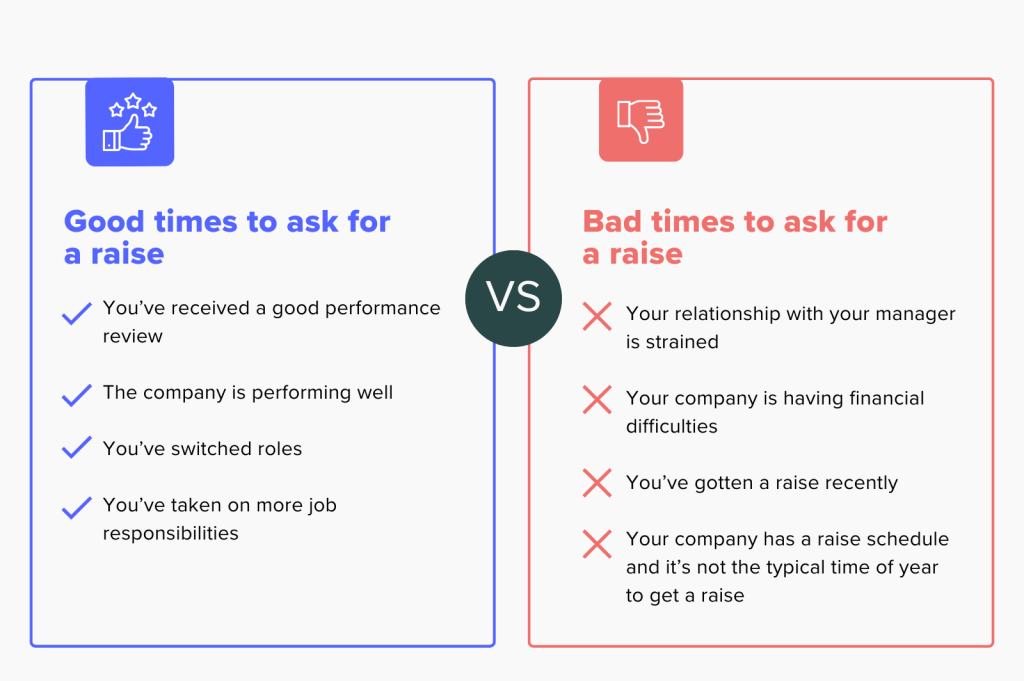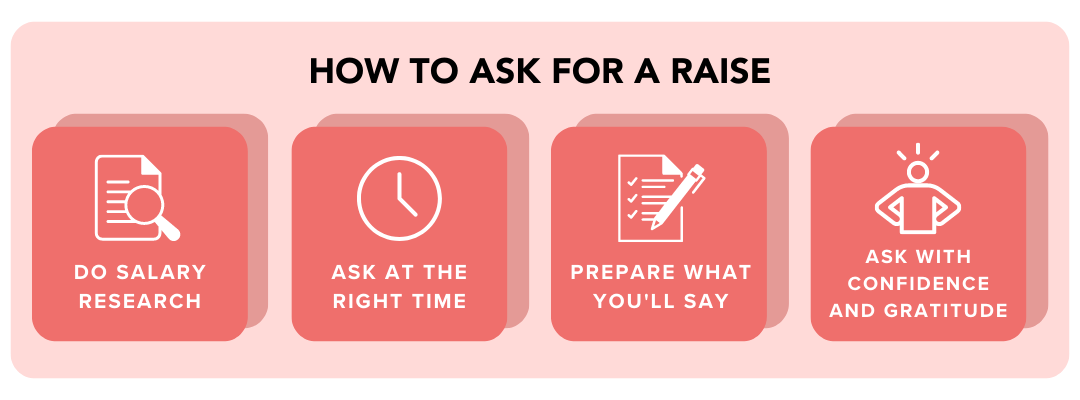Asking for a raise is no easy task, even if you feel that it is long overdue. The process can be nerve-wracking and awkward, but it’s something that most people in the workforce will have to do at one point or another. And for most, it pays off. Surveys show that around 70% of workers who ask for a raise do, in fact, get some sort of pay increase.
So what’s the best way to ask for a raise? Though it can feel more like an art than a science, the good news is that it can be easy with a little preparation.
Know when to ask for a raise
Part of the art of asking for a raise is choosing the right time. There are good times to ask— and bad ones.

Good times to ask
In situations like the ones below, your employer will likely be more open to upping your salary.
- You’ve received a good performance review: Receiving great marks and feedback on your latest performance review can be the perfect opportunity to ask for a raise.
- The company is performing well: Has your company been hitting financial milestones and exceeding expectations? A company with few budgetary concerns is usually more likely to grant raises to employees.
- You’ve taken on more job responsibilities: If your job description has changed since you started working or your last raise, it may be time to reassess your pay and ask for more money to compensate for the additional work that you perform.
Keep in mind that just because you meet these criteria, it isn’t a sure bet that you’ll get the raise or the amount you’re asking for. You’ll still want to do your research and follow the tips that we outline later in the article.
Bad times to ask
There are plenty of great reasons to ask for a higher salary, but there are also some situations where your ask may not be well-received. If one of the following applies to you, reconsider holding out for a better time.
- You have a poor relationship with your manager: A poor relationship with your manager may, unfortunately, hinder your ability to get a raise. Do what you can to improve the relationship before asking for more money.
- Your company is having financial difficulties: If your employer is under financial strain, they might not have the budget to pay you more money.
- You’ve gotten a raise recently or your company has a raise schedule: It’s standard to wait at least a year after a raise to ask for another one. If you recently received a raise, hold off until a year has passed. Similarly, if your company has a raise schedule and the date where negotiations begin is coming up, wait it out.
Just because it’s not a great time right now doesn’t mean that it will never be a good time. Put your ask on hold and reassess the situation in a few months.

How to ask for a raise
Advocating for yourself may not come naturally, but know that it is totally normal to ask for a raise!
People do it all the time, and your manager should be prepared to handle situations regarding salary. If you believe that you are underpaid, this is a conversation you will most likely need to have to be fairly compensated for your work.
1. Do your salary research.
You’ll want to arm yourself with some facts and statistics before heading into your meeting. Coming into your meeting with data shows that you’ve put thought into coming up with a reasonable number.
Things to know include:
- Your wage history and past raises
- The average salary for other professionals in your position with your level of experience
- The cost of living in your city and how your current salary compares
- What others at the company are getting paid, if you have access to that information
- Your company’s policy on raises
It’s also helpful to list any skills, knowledge, or recognition you’ve gained since the last time you got a raise. This can include things like certifications, licenses, courses that you’ve taken, or industry awards or recognitions you’ve received.
2. Choose the right time to set up your meeting.
We talked about timing your ask correctly earlier. While it’s important to consider the big picture of your timing, it’s also important to consider the details.
You’ll want to get something official on your boss’s calendar. Choose a meeting time that is convenient for them so that they can listen to your request without being rushed or preoccupied.
3. Prepare what you’ll say.
You’ve done your homework, now you just need to make sure that your message gets across. Prepare what you’ll say to your manager during the meeting. While you don’t need to have a scripted speech typed out, jotting down a few notes can be helpful, especially if you think you may get nervous going into the meeting.
4. Ask with confidence and gratitude.
How you ask is just as important as what you say.
Ask with confidence— but be careful not to come off as egotistical. Discuss your research, as well as any recent achievements or accomplishments at work that you can use to support your ask and prove your worth. At the end of your meeting, be sure to thank your manager for taking the time to listen.
What to do if you get denied a raise
Just because you ask for a raise doesn’t necessarily mean that you will get one. Your company may not have the budget or it may not be a good time. Regardless of the reason, here are a few things that you should keep in mind.
- Keep calm and respectful. If you didn’t get a raise, don’t harm your chances of getting one in the future by responding rudely.
- Ask what you can do to earn a raise. If you are denied a raise, it’s okay if you ask what you can do to get it next time. You may learn that it has nothing to do with your performance. But on the off chance that it is, your manager may give you a goal to strive towards or something that you need to improve upon.
- Ask for non-monetary benefits. If your request for a higher salary was denied, you may still be able to get some sort of extra employee benefits for your hard work such as reduced work hours, remote work opportunities, and more.
- Check-in later. Your manager may say to check back in a few months down the road about your request. If this is the case, be sure to follow up.
It’s also possible that after this process, you will determine that your employer is no longer the best fit for you. Maybe you’ve hit the ceiling on what you can earn there or there is no room for growth. Perhaps your employer handled themselves poorly while negotiating a new salary. Whatever the reason, this may be a good time to start exploring your other career options.
Finding fair compensation
Here at JobSage, we’re setting out to build an employer review site around things that matter most to jobseekers— inclusion, growth, purpose, feedback, flexibility, and compensation. We want to help you find the right employer by getting answers to the questions you care about. Join JobSage for guidance in your job search or to leave a review for your current employer to create a more open, transparent conversation in and around the workplace.
